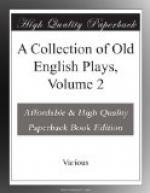and the fine lines descriptive of the Armada are just such as we might expect from the author of the closing scenes of the second part of If you know not me, you know nobody. Heywood was fond of stirring adventures: he is quite at home on the sea, and delights in nothing more than in describing a sea-fight; witness his Fortunes by Land and Sea, and the two parts of the Fair Maid of the West. But the underplot bears even clearer traces of Heywood’s manner. Manuel is one of those characters he loved to draw—a perfect Christian gentleman, incapable of baseness in word or deed. Few situations could be found more touching than the scene (iii. 3), where Manuel defends with passionate earnestness the honour of his absent brother, Henrico, and tries to comfort his heart-broken father. Heywood dealt in extremes: his characters are, as a rule, either faultless gentlemen or abandoned scoundrels. Hence we need not be surprised that Henrico exceeds other villains in ruffianism as much as his brother, the gentle Manuel, surpasses ordinary heroes in virtue. The characters of Henrico’s contracted bride, Eleonora, and Catalina, the good wife of a vicious husband, are drawn tenderly and skilfully. Heywood’s eyes were oftener dim with tears than radiant with laughter; yet, with all his sympathy for the afflicted and the fallen, he never took a distorted view of society, but preserved untainted to the end a perennial spring of cheerfulness.
I now leave the reader to the enjoyment of this old play, which, whether it be Heywood’s or not, certainly deserves the attention of all faithful students of our inexhaustible dramatic literature.
NOTE.—I gratefully acknowledge the assistance that I have received from F.G. Fleay, Esq., in preparing this volume for the press. To ensure as much accuracy as possible, Mr. Fleay has read the proof-sheets throughout.[4] By the same gentleman’s kindness I am able to correct the following misprints in the first volume:—
p. 37, l. 23, for “Yet can give,” read, “Yet can I give.”
p. 71, l. 18, del. comma after “live.”
p. 103, l. 9, del. “we.”
p. 119, 7 from bottom, for “she doth preferd doth see,” read “she thus preferd,” &c.
p. 142, 9 from bottom, for “vouchsafed,” read “vouchsafe.”
p. 154, l. 19, for “There they are,” read “I, here they are.”
p. 190, l. 24, for “woman” read “women.”
p. 194, l. 12, for “unwist,” read “unjust.”
p. 228, last line, for “Equire,” read “Squire.”
p, 258, l. 29, for “1639,” read “1612.”
p. 274, l. 16, for “whore,” read “whore’s;” and in the next line, for “sunnes,” read “sinnes.”
p. 276, l. 4, after “Do not my Dons know,” add “me.”
p. 281, 4 from bottom, for “wo,” read “two.”
p. 311, l. 12, for “sol-Re-fa-mi,” read “sol-Re-me-fa-mi.” In l. 19, for “Ra.” read “Re.”
p. 317, l. 21, for “goon,” read “good.”




